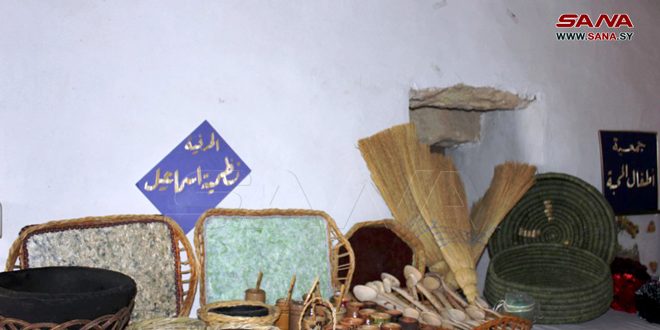Craftswoman Nazmiya Ismail has been practicing traditional crafts of various kinds since 1992, with the aim of preserving heritage and its presence in people’s daily lives and transmitting it to youth and children.
Ismail entered the world of traditional crafts with the profession of tailoring, sewing clothes and the craft of weaving woolen clothes. She continued her journey by learning the rest of the professions with bamboo and panels made of silk cocoons, making straw dishes, painting on glass, making all kinds of accessories, embroidery on cloth, recycling household and environment waste products and paper folding.
She then turned to pottery making because, as she explained during an interview with SANA’s News Agency reporter, it is one of the most important elements of Syrian popular heritage, and is widely spread due to its health value in preserving foods and drinks. She learned the origins and principles of its making from an elderly woman in one of the villages of Sheikh Badr, who mastered the art of making pottery manually.
Because Ismail is a certified trainer at the Baath Vanguards Organization to teach the crafts of pottery and straw making to children and she is also a volunteer to train children in the Special Olympiad. She sought to transfer these professions to all those wishing from the younger generation, children and women, while seeking to provide job opportunities through community initiatives with government agencies, organizations and civil associations.
 Moreover, Ismail, who has been working as director of the Handicrafts Market since its establishment in May 2021, is currently training inmates in Tartous Central Prison on the sewing profession in coordination between the Children of Love association for Children with Disabilities, which she supervises, alongside the Prisoners’ Care Association.
Moreover, Ismail, who has been working as director of the Handicrafts Market since its establishment in May 2021, is currently training inmates in Tartous Central Prison on the sewing profession in coordination between the Children of Love association for Children with Disabilities, which she supervises, alongside the Prisoners’ Care Association.
Her duties in the Board of Directors of the Heritage Revival community in the Drakeesh region, in the Life Skills Team and as a director of volunteers, did not distract her from participating in many exhibitions and festivals inside Syria, including the Al-Basil Festival for Creativity and Invention in 2016 in the bamboo craft, and in the Syrian Women Defying Crises exhibition. She also participated in preparing booklets on the tangible and intangible heritage alongside researchers from the Directorates of Tourism and Environment and the Craftsmen Union.
Ismail reviewed the difficulties experienced by craftsmen mainly in securing raw materials, distributing the product and the disproportion between the actual cost and the price, however, she stresses that there is no alternative to continuing with it and teaching it to others in order to preserve the Syrian heritage, which represents Syria’s special cultural identity.
Nazmiya Ismail finally hopes that these traditional handicrafts will gain their real right and status by increasing the support provided to them and providing everything they need to continue and be passed on from generation to generation.
Leen Al Salman

